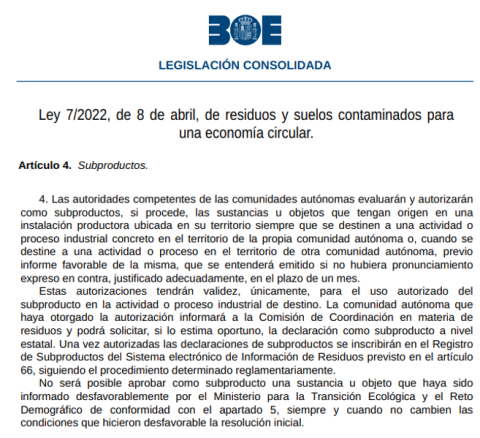The impact of legislative reform on waste in Spain: a case of valorisation via by-product

About this good practice
The practice addresses challenges in the waste valorisation process under the former law in Spain, characterized by a long and bureaucratic decision procedure managed by the central government. The introduction of the national "Law 7/2022 on waste and contaminated soils for a circular economy" has improved the situation. This legislation, transposing the EU Directive 2018/851, simplifies the valorisation process by shifting management to regional authorities. The decision procedures are now significantly shorter, and the new law introduces the concept of "by-product".
The main stakeholders are regional authorities, since the new law empowers them to evaluate and approve by-product declarations, with a simpler administrative process. This is the case of the regional Government of Navarra, which has played a crucial role in approving the by-product application of ROCKWOOL Peninsular. The beneficiaries include companies like ROCKWOOL, which has managed to reclassify its stone wool scraps from “waste” to “by-products”.
ROCKWOOL’s successful application for by-product status has simplified the administration management of the company, and has reduced costs associated to the transfer, bail and documentation of waste management. The company's reuse of stone wool scraps contributes to environmental sustainability by minimizing the extraction of raw materials and reducing landfill disposal, which are also regional goals for public authorities and foster a circular economy.
Resources needed
The resources of the Government of Navarra have not changed after the publication of the new law, and the current staff is assuming the new by-product authorisations.
ROCKWOOL Peninsular needed external support to prepare all the documents required to present to regional authorities.
Evidence of success
The declaration of by-product of stone wool scraps is the first one approved by the Government of Navarra for inert or inorganic waste in the new regulatory framework.
Under the new law, communication between public authorities and companies is more fluid. The submission process is simpler, and e-mail is being used at regional level, avoiding the delays caused by former tools, which involved multiple agencies.
Companies such as ROCKWOOL expect less administrative workload and lower costs.
Potential for learning or transfer
The by-product declaration of stone wool scraps, initially valid in the region of Navarra, will undergo a process for national expansion which would bring a broader implementation. If approved, any region of Spain would be able to use stone wool scraps as by-products.
The successful approval of stone wool scraps as a by-product may encourage other companies to follow this example and look for ways to valorise materials that would otherwise be considered “waste”, many of which go to landfill disposal.
Furthermore, it helps architects and construction companies to get any of the several certifications for sustainable construction, such as: BREEAM. (Building Research Establishment Environmental Assessment Method); LEED. (Leadership in Energy and Environmental Design); Green certificate (Evaluation of efficiency of building sites).
Further information
Images

